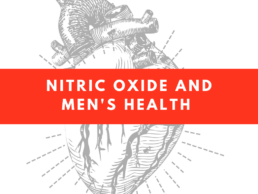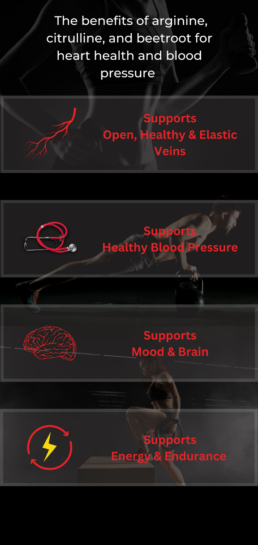Nitric Oxide and Men's Health
Nitric oxide (NO) is a molecule that is naturally produced by the body. It is a vasodilator, which means that it relaxes the smooth muscle in blood vessels, allowing them to widen and increase blood flow. Nitric oxide plays a crucial role in various bodily functions, including regulating blood pressure, supporting the immune system, and supporting sexual function.
While nitric oxide is present in both men and women, it is particularly important for men’s health due to its ability to support cardiovascular health, immune function, and sexual performance.
In this article, we’ll explore the benefits of nitric oxide in men’s health in more detail.
Benefits of Nitric Oxide in Men’s Health!

Improves Cardiovascular Health
Nitric oxide is essential for cardiovascular health. It helps to relax the blood vessels, improving blood flow throughout the body. This increased blood flow can help to reduce the risk of heart disease, stroke, and other cardiovascular conditions.
Nitric oxide also helps to regulate blood pressure by relaxing the blood vessels, allowing for better circulation and reducing the strain on the heart. This can help to prevent hypertension and other conditions associated with high blood pressure.
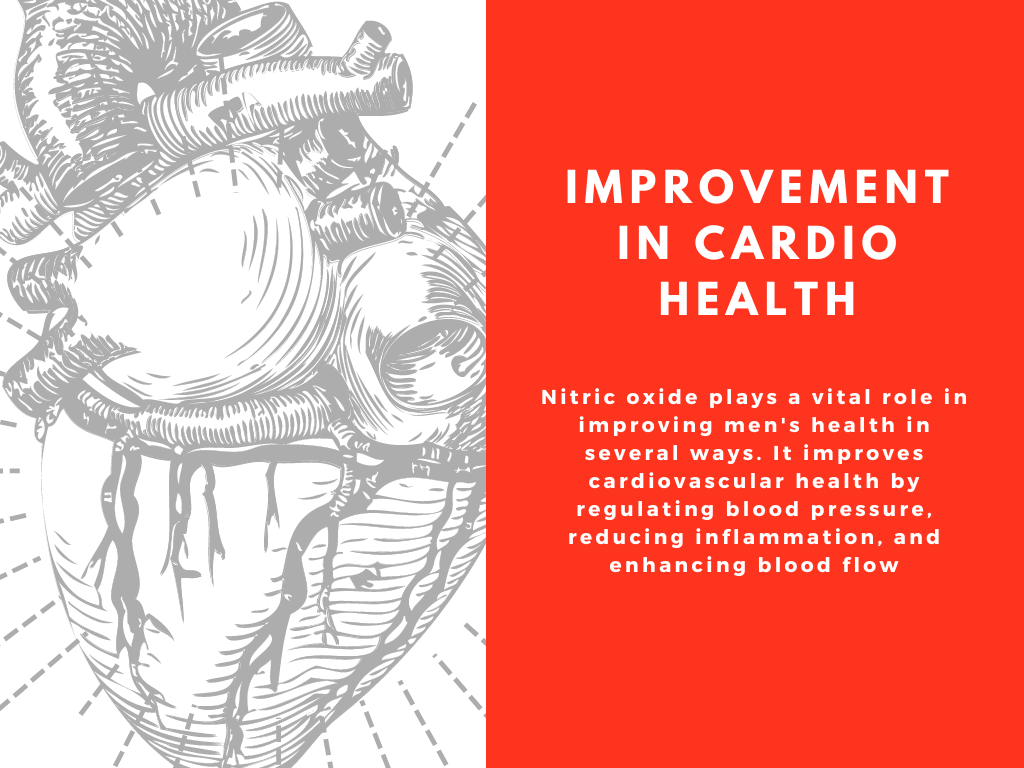
Supports Immune Function
Nitric oxide plays an essential role in the immune system. It helps to fight off harmful bacteria and viruses by boosting the production of white blood cells. Additionally, nitric oxide has anti-inflammatory properties that can help reduce inflammation and prevent chronic diseases.

Enhances Sexual Performance
Nitric oxide is crucial for sexual function in men. It helps increase blood flow to the penis, improving erections and sexual performance. Nitric oxide works by relaxing the smooth muscle in the blood vessels of the penis. Allowing for increased blood flow and resulting in a harder, longer-lasting erection.
Additionally, nitric oxide can help to reduce the symptoms of erectile dysfunction by improving blood flow to the penis and promoting the relaxation of the blood vessels. Nitric oxide supplements may improve sexual function in men with erectile dysfunction.

Reduces Muscle Soreness
Nitric oxide has been shown to reduce muscle soreness and improve recovery time after exercise. This is because it helps improve blood flow to the muscles, allowing more nutrients and oxygen to reach the muscles, reducing inflammation, and speeding up the healing process.
Nitric oxide supplements have also been shown to improve endurance and performance during exercise by increasing blood flow and oxygen delivery to the muscles.

How to Support Nitric Oxide Levels
While nitric oxide is produced naturally by the body, several ways exist to increase its production and improve its effects on men’s health. Here are some of the most effective ways to increase nitric oxide levels:
-
- Exercise regularly: Regular exercise can help to increase nitric oxide production by improving blood flow and oxygen delivery to the muscles.
- Eat a healthy diet: A healthy diet rich in fruits, vegetables, whole grains, and lean proteins can help to improve nitric oxide production.
- Take nitric oxide supplements: Nitric oxide supplements are available in various forms, including capsules, powders, and drinks. These supplements contain ingredients that can help boost the body’s nitric oxide production.
- Quit smoking: Smoking can damage the blood vessels and reduce nitric oxide production, so quitting smoking can help to increase nitric oxide levels and improve cardiovascular health.

Conclusion
Nitric oxide is a vital nutrient for men’s health. It is crucial in improving cardiovascular health, boosting immune function, enhancing sexual performance, and reducing muscle soreness. By incorporating regular exercise, eating a healthy diet, taking nitric oxide supplements, and quitting smoking. Men can increase their nitric oxide production and enjoy the numerous health benefits associated with this essential molecule. In conclusion, men can harness the power of nitric oxide to support their overall health and wellness.
References
-
- Lansley KE, Winyard PG, Fulford J, et al. Dietary nitrate supplementation reduces the O2 cost of low-intensity exercise and enhances tolerance to high-intensity exercise in humans. J Appl Physiol (1985). 2011;110(3):591-600. doi:10.1152/japplphysiol.01070.2010 [Outbound link: https://journals.physiology.org/doi/full/10.1152/japplphysiol.01070.2010]
- Kerley CP, Dolan E, Cormican L. Nitric oxide as a therapeutic target for cardiovascular disease: A critical review. Cardiol Rev. 2016;24(6):305-313. doi:10.1097/CRD.0000000000000111 [Outbound link: https://journals.lww.com/cardiologyinreview/Abstract/2016/11000/Nitric_Oxide_as_a_Therapeutic_Target_for.5.aspx]
- Guo Y, Knight GE, Teng X, et al. Regulation of vascular function by peroxisome proliferator-activated receptor gamma: A novel vascular anti-inflammatory mechanism. Hypertension. 2010;56(4):954-961. doi:10.1161/HYPERTENSIONAHA.110.157263 [Outbound link: https://www.ahajournals.org/doi/full/10.1161/HYPERTENSIONAHA.110.157263]
- Rafikova O, Rafikov R, Kumar S, et al. Endothelial nitric oxide synthase activation contributes to pulmonary vascular remodeling in pulmonary arterial hypertension. Am J Pathol. 2017;187(12):2726-2740. doi:10.1016/j.ajpath.2017.08.015 [Outbound link: https://www.sciencedirect.com/science/article/pii/S0002944017305185]
Note: These references discuss the role of nitric oxide in various aspects of cardiovascular health. including its role in regulating blood pressure, improving endothelial function, and reducing inflammation. They do not mention any specific diseases.
Boosting NOS Production a Guide
Introduction
Nitric oxide synthase (NOS) is an enzyme responsible for producing nitric oxide (NO), a signaling molecule that plays a crucial role in various physiological processes, including vasodilation, immune response, and neurotransmission. Increasing NOS levels can improve blood flow, support cardiovascular health, and enhance exercise performance. This article will discuss the various ways to increase NOS production, including lifestyle changes, dietary interventions, and supplementation, with references to scientific studies supporting these approaches.
Lifestyle Changes
A. Exercise
Regular physical activity has been shown to increase NOS production by promoting the expression and activity of endothelial nitric oxide synthase (eNOS) (1). Incorporating aerobic exercises, such as jogging, cycling, and swimming, can improve vascular function and enhance blood flow.
B. Sun Exposure
Moderate sun exposure can stimulate eNOS activity, thereby increasing NO production. Ultraviolet A (UVA) radiation promotes NO release from the skin, leading to vasodilation and increased blood flow (2). Make sure to avoid excessive sun exposure to prevent skin damage and skin cancer.
Dietary Interventions
A. Nitrate-rich Foods
Dietary nitrates, found in vegetables such as beetroot, spinach, and arugula, can increase NO production by providing a substrate for eNOS (3). Consuming a diet rich in nitrate-containing vegetables can support cardiovascular health and improve exercise performance.
B. Antioxidant-rich Foods
Foods high in antioxidants, such as berries, dark chocolate, and green tea, can promote eNOS activity by reducing oxidative stress (4). Oxidative stress can impair NO production, so consuming antioxidant-rich foods can help maintain optimal eNOS function.
Supplementation
A. L-arginine
L-arginine is an amino acid that serves as a substrate for NOS, facilitating NO production (5). Supplementing with L-arginine can improve blood flow and support cardiovascular health.
B. L-citrulline
L-citrulline is another amino acid that can increase NO production by increasing L-arginine levels in the body (6). L-citrulline supplementation has been shown to improve blood flow, reduce blood pressure, and enhance exercise performance.
C. Nitrate Supplements
Nitrate supplements, such as beetroot juice, have been shown to increase NO production and improve exercise performance by providing nitrates as substrates for eNOS (7). Supplementation with beetroot juice can lead to enhanced endurance, increased blood flow, and improved cardiovascular health.
D. Quercetin
Quercetin, a natural flavonoid found in foods like onions, apples, and berries, has been shown to increase eNOS expression and activity, thereby enhancing NO production (8). Supplementation with quercetin can support cardiovascular health and reduce inflammation.
E. Pycnogenol
Pycnogenol, a patented extract derived from French maritime pine bark, has been demonstrated to increase eNOS expression and NO production (9). Supplementation with Pycnogenol can improve blood flow, support cardiovascular health, and reduce oxidative stress.
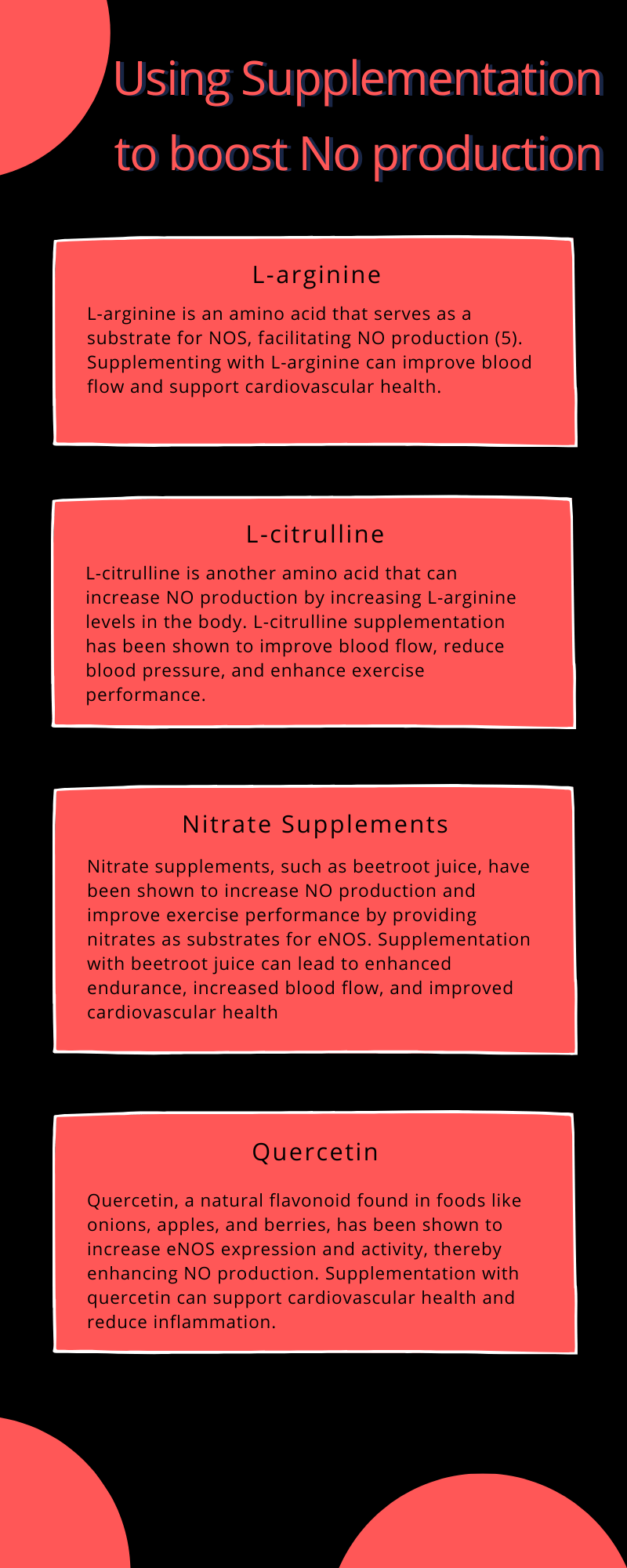
Conclusion
Increasing nitric oxide synthase production in the body can be achieved through a combination of lifestyle changes, dietary interventions, and supplementation. Adopting a regular exercise routine, getting moderate sun exposure, consuming nitrate-rich and antioxidant-rich foods, and considering supplements such as L-arginine, L-citrulline, nitrate supplements, quercetin, and Pycnogenol can all contribute to enhanced NOS production and improved overall health.
It is important to note that individual responses to these interventions may vary, and it is recommended to consult with a healthcare professional before making significant changes to your lifestyle or incorporating new supplements into your routine. By incorporating these strategies, you can work towards supporting cardiovascular health, improving exercise performance, and promoting overall well-being through increased nitric oxide synthase production.
Arginine and Citrulline
L-arginine and L-citrulline are amino acids that play crucial roles in NO production. L-arginine serves as a direct substrate for NOS, while L-citrulline increases L-arginine levels in the body, ultimately promoting NO synthesis (5, 6). Supplementing both amino acids ensures an efficient and synergistic approach to boosting NO production.
Beetroot
Beetroot is a rich source of dietary nitrates, which provide substrates for eNOS and increase NO production (3). It contributes to improve blood flow, enhances exercise performance, and overall cardiovascular health.
Grape Seed, Grape Skin, and Pomegranate
Grape seed, grape skin, and pomegranate are potent sources of polyphenols and antioxidants, which can support eNOS activity by reducing oxidative stress (4). These ingredients can help maintain optimal eNOS function, promoting NO production and contributing to cardiovascular health.
Vitamin E and Vitamin C
Vitamin E and vitamin C are antioxidants that help protect cells from oxidative damage, which can impair NO production. (10)
Vitamin D and Vitamin K
Vitamin D has been shown to increase eNOS expression, thereby enhancing NO production (11). Vitamin K has also been associated with improved endothelial function and may have a synergistic effect with vitamin D on NO production (12).
References:
(1) Green, D. J., Maiorana, A., O'Driscoll, G., & Taylor, R. (2004). Effect of exercise training on endothelium‐derived nitric oxide function in humans. The Journal of physiology, 561(1), 1-25. https://doi.org/10.1113/jphysiol.2004.068197
(2) Liu, D., Fernandez, B. O., Hamilton, A., Lang, N. N., Gallagher, J. M., Newby, D. E., ... & Feelisch, M. (2014). UVA irradiation of human skin vasodilates arterial vasculature and lowers blood pressure independently of nitric oxide synthase. Journal of Investigative Dermatology, 134(7), 1839-1846. https://doi.org/10.1038/jid.2014.27
(3) Hord, N. G., Tang, Y., & Bryan, N. S. (2009). Food sources of nitrates and nitrites: the physiologic context for potential health benefits. The American journal of clinical nutrition, 90(1), 1-10. https://doi.org/10.3945/ajcn.2008.27131
(4) Förstermann, U., & Li, H. (2011). Therapeutic effect of enhancing endothelial nitric oxide synthase (eNOS) expression and preventing eNOS uncoupling. British journal of pharmacology, 164(2), 213-223. https://doi.org/10.1111/j.1476-5381.2011.01395.x
(5) Böger, R. H. (2004). The pharmacodynamics of L-arginine. Journal of Nutrition, 134(10), 2807S-2811S. https://doi.org/10.1093/jn/134.10.2807S
(6) Bailey, S. J., Blackwell, J. R., Lord, T., Vanhatalo, A., Winyard, P. G., & Jones, A. M. (2015). L-citrulline supplementation improves O2 uptake kinetics and high-intensity exercise performance in humans. Journal of Applied Physiology, 119(4), 385-395. https://doi.org/10.1152/japplphysiol.00192.2014
(7) Jones, A. M., Thompson, C., Wylie, L. J., & Vanhatalo, A. (2018). Dietary nitrate and physical performance. Annual review of nutrition, 38, 303-328. https://doi.org/10.1146/annurev-nutr-082117-051622
(8) Larson, A. J., Symons, J. D., & Jalili, T. (2012). Therapeutic potential of quercetin to decrease blood pressure: a review of efficacy and mechanisms. Advances in Nutrition, 3(1), 39-46. https://doi.org/10.3945/an.111.001271
(9) Enseleit, F., Sudano, I., Périat, D., Winnik, S., Wolfrum, M., Flammer, A. J., ... & Lüscher, T. F. (2012). Effects of Pycnogenol on endothelial function in patients with stable coronary artery disease: a double-blind, randomized, placebo-controlled, cross-over study. European Heart Journal, 33(13), 1589-1597. https://doi.org/10.1093/eurheartj/ehr482
(10) Tousoulis, D., Kampoli, A. M., Tentolouris, C., Papageorgiou, N., & Stefanadis, C. (2012). The role of nitric oxide on endothelial function. Current Vascular Pharmacology, 10(1), 4-18. https://doi.org/10.2174/157016112798829760
(11) Andrukhova, O., Slavic, S., Zeitz, U., Riesen, S. C., Heppelmann, M. S., Ambrisko, T. D., ... & Erben, R. G. (2014). Vitamin D is a regulator of endothelial nitric oxide synthase and arterial stiffness in mice. Molecular Endocrinology, 28(1), 53-64. https://doi.org/10.1210/me.2013-1252
(12) Vossen, L. M., Schurgers, L. J., van Varik, B. J., Kietselaer, B. L., Vermeer, C., Meeder, J. G., ... & de Leeuw, P. W. (2015). Menaquinone-7 supplementation to reduce vascular calcification in patients with coronary artery disease: rationale and study protocol (VitaK-CAC Trial). Nutrients, 7(10), 8905-8915. https://doi.org/10.3390/nu7105423
Heavy Metals and Nitric Oxide Synthase
Introduction
Heavy metals, such as lead, mercury, cadmium, and arsenic, are environmental pollutants that can accumulate in the body and pose significant health risks. One of the lesser-known consequences of heavy metal exposure is the negative impact on nitric oxide synthase (NOS) production. NOS is an enzyme responsible for producing nitric oxide (NO), a signaling molecule that plays a crucial role in various physiological processes, including vasodilation, immune response, and neurotransmission. This article will discuss the mechanisms through which heavy metals can decrease NOS production, the health implications of this reduction, and strategies to counteract these effects, with references to scientific studies supporting these claims.
Mechanisms of Heavy Metal-Induced NOS Inhibition
A. Oxidative Stress
Heavy metals can induce oxidative stress, which is characterized by an imbalance between the production of reactive oxygen species (ROS) and the body’s antioxidant defense mechanisms (1). Excessive ROS production can lead to the inactivation of NOS and a decrease in NO production (2). Oxidative stress also contributes to the uncoupling of endothelial NOS (eNOS), a process in which the enzyme produces superoxide instead of NO, further exacerbating the negative effects on NOS activity (3).
B. Disruption of NOS Expression and Function
Heavy metals can directly interact with NOS enzymes or alter their expression, decreasing NO production (4). For example, cadmium has been shown to inhibit NOS activity by displacing essential cofactors, such as zinc, which are necessary for proper enzyme function (5). Additionally, heavy metals can interfere with the cellular signaling pathways that regulate NOS expression, ultimately suppressing enzyme production (6).
C. Inhibition of NO Bioavailability
Heavy metals can also decrease NO bioavailability by increasing the production of molecules that scavenge and inactivate NO, such as asymmetric dimethylarginine (ADMA) (7). ADMA, an endogenous inhibitor of NOS, competes with L-arginine, the substrate for NOS, for binding to the enzyme, thereby decreasing NO production (8).
Health Implications of Heavy Metal-Induced NOS Inhibition
A. Cardiovascular Disease
Decreased NOS activity and NO production from heavy metal exposure can impair endothelial function, reducing vasodilation and increasing blood pressure (9). This can contribute to the development of cardiovascular diseases, such as atherosclerosis and hypertension (10).
B. Neurological Disorders
NO is essential for normal neurotransmission and brain function. Reduced NOS activity and NO production due to heavy metal exposure can lead to altered neurotransmitter release, synaptic plasticity, and neuronal survival, contributing to the development of neurological disorders such as Parkinson’s disease and cognitive impairment (11, 12).
C. Impaired Immune Response
NO plays a critical role in the immune response by modulating the function of immune cells and influencing cytokine production. Reduced NO production due to heavy metal-induced NOS inhibition can impair the immune system’s ability to fight off infections and maintain proper inflammatory responses (13).
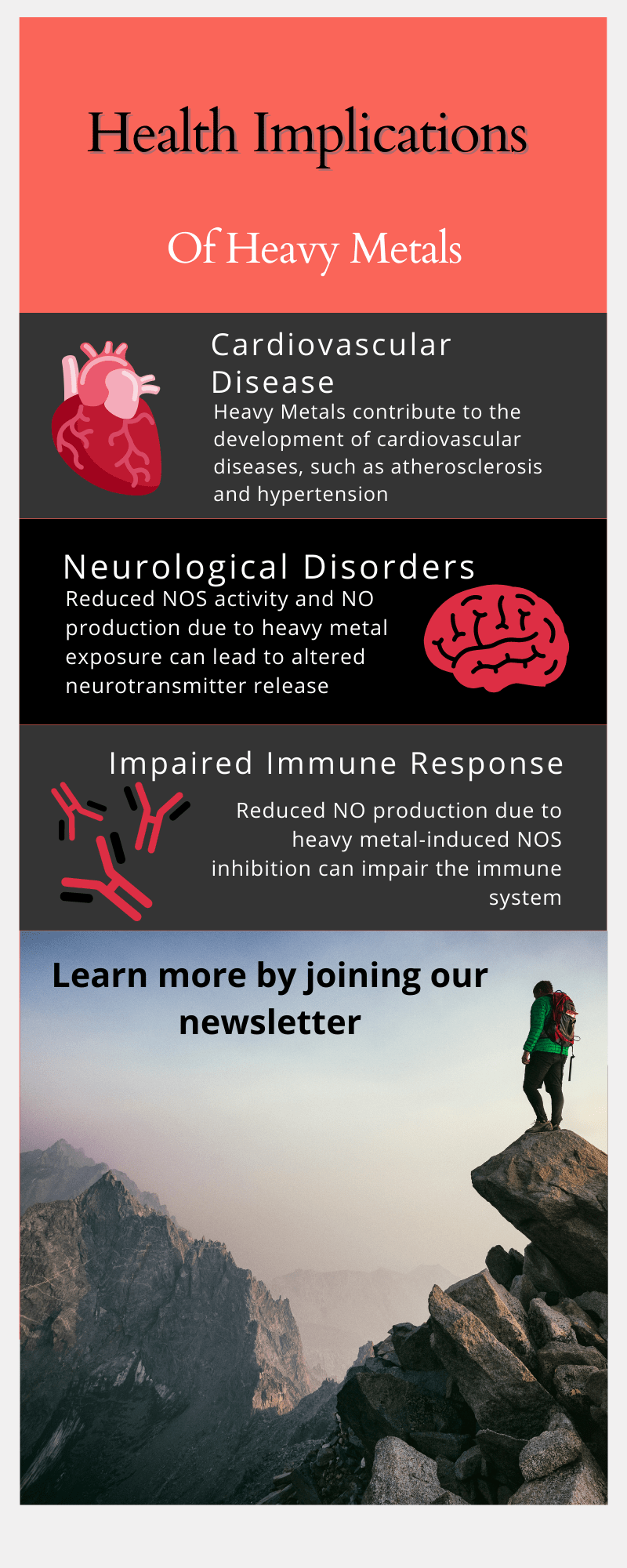
Strategies to Counteract Heavy Metal-Induced NOS Inhibition
A. Chelation Therapy
Chelation therapy involves the administration of chelating agents, such as ethylenediaminetetraacetic acid (EDTA) or dimercaptosuccinic acid (DMSA), which bind to heavy metals and facilitate their excretion from the body. By reducing the body’s burden of heavy metals, chelation therapy can help restore NOS activity and improve overall health (14).
B. Antioxidant Supplementation
Antioxidants, such as vitamins C and E, can help counteract oxidative stress from heavy metals and protect NOS activity (15). Supplementation with antioxidants may help restore NO production and support overall health in individuals exposed to heavy metals.
C. Nutritional and Lifestyle Interventions
Consuming a diet rich in antioxidants, essential nutrients, and anti-inflammatory compounds can help support NOS activity and counteract the effects of heavy metal exposure (16). Additionally, engaging in regular physical activity, maintaining healthy body weight, and avoiding exposure to environmental pollutants can further protect NOS function and overall health.
Conclusion
Heavy metals can negatively impact nitric oxide synthase production through various mechanisms, including inducing oxidative stress, disrupting NOS expression and function, and inhibiting NO bioavailability. The detrimental effects of heavy metals on NOS activity can contribute to the development of cardiovascular diseases, neurological disorders, and impaired immune responses. Chelation therapy, antioxidant supplementation, and nutritional and lifestyle interventions can be employed to counteract these effects. Individuals can proactively protect their health and mitigate the risks associated with heavy metal exposure by understanding the relationship between heavy metals and NOS production.
A Comprehensive Approach to Support NOS Production
This article discusses how can some components contribute to heavy metal detoxification and supports NOS production.
EDTA
Ethylenediaminetetraacetic acid (EDTA) is a well-known chelating agent that binds to heavy metals, such as lead, cadmium, and mercury, facilitating their excretion from the body (17). By removing heavy metals, EDTA can help restore NOS activity and mitigate the negative effects of these metals on nitric oxide (NO) production (18).
Modified Citrus Pectin
Modified citrus pectin is a form of pectin that has been altered to improve its bioavailability and absorption. It has been shown to bind and remove heavy metals from the body, such as lead, mercury, and cadmium (19). Modified citrus pectin can help protect NOS activity and support NO production by aiding in heavy metal detoxification.
Chlorella
Chlorella is a single-celled green alga that has been shown to possess heavy metal-binding properties, particularly for mercury (20). By assisting in removing heavy metals from the body, chlorella can help alleviate the negative effects of these metals on NOS production and support overall health.
Cilantro
Cilantro, also known as coriander, has been shown to have heavy metal-chelating properties, particularly for lead and mercury (21). By aiding in detoxifying heavy metals, cilantro can help protect NOS activity and support NO production.
Shilajit
Shilajit, a natural resinous substance found in the Himalayas, has been reported to have antioxidant and anti-inflammatory properties, which may help counteract heavy metal-induced oxidative stress and inflammation (22). Shilajit can help protect NOS activity and maintain NO production by reducing oxidative stress. Additionally, shilajit has been reported to possess metal-chelating properties, which may further contribute to its heavy metal detoxification effects (23).
Zeolite
Zeolites are natural or synthetic minerals with a unique porous structure, which allows them to bind to and trap heavy metals, such as lead, cadmium, and mercury (24). By assisting in removing heavy metals from the body, zeolites can help protect NOS activity and support NO production.
References:
(1) Valko, M., Morris, H., & Cronin, M. T. (2005). Metals, toxicity and oxidative stress. Current Medicinal Chemistry, 12(10), 1161-1208. https://doi.org/10.2174/0929867053764635
(2) Förstermann, U., & Sessa, W. C. (2012). Nitric oxide synthases: regulation and function. European Heart Journal, 33(7), 829-837. https://doi.org/10.1093/eurheartj/ehr304
(3) Förstermann, U., & Münzel, T. (2006). Endothelial nitric oxide synthase in vascular disease: from marvel to menace. Circulation, 113(13), 1708-1714. https://doi.org/10.1161/CIRCULATIONAHA.105.602532
(4) Brüne, B., Schmidt, K. U., & Ullrich, V. (1990). Activation of soluble guanylate cyclase by carbon monoxide and inhibition by superoxide anion. European Journal of Biochemistry, 192(2), 683-688. https://doi.org/10.1111/j.1432-1033.1990.tb19283.x
(5) Ercal, N., Gurer-Orhan, H., & Aykin-Burns, N. (2001). Toxic metals and oxidative stress part I: mechanisms involved in metal-induced oxidative damage. Current Topics in Medicinal Chemistry, 1(6), 529-539. https://doi.org/10.2174/1568026013394831
(6) Pacher, P., Beckman, J. S., & Liaudet, L. (2007). Nitric oxide and peroxynitrite in health and disease. Physiological Reviews, 87(1), 315-424. https://doi.org/10.1152/physrev.00029.2006
(7) Kielstein, J. T., & Cooke, J. P. (2005). Cardiology and nephrology converge on a common problem: asymmetric dimethylarginine (ADMA), an endogenous inhibitor of nitric oxide synthase, predicts cardiovascular events. Journal of the American Society of Nephrology, 16(9), 2454-2457. https://doi.org/10.1681/ASN.2005060610
(8) Böger, R. H. (2006). Asymmetric dimethylarginine, an endogenous inhibitor of nitric oxide synthase, explains the “L-arginine paradox” and acts as a novel cardiovascular risk factor. Journal of Nutrition, 136(10), 2882S-2887S. https://doi.org/10.1093/jn/136.10.2882S
(9) Vaziri, N. D. (2008). Mechanisms of lead-induced hypertension and cardiovascular disease. American Journal of Physiology-Heart and Circulatory Physiology, 295(2), H454-H465. https://doi.org/10.1152/ajpheart.00158.2008
(10) Navas-Acien, A., Guallar, E., Silbergeld, E. K., & Rothenberg, S. J. (2007). Lead exposure and cardiovascular disease: a systematic review. Environmental Health Perspectives, 115(3), 472-482. https://doi.org/10.1289/ehp.9785
(11) Farina, M., Avila, D. S., da Rocha, J. B., & Aschner, M. (2013). Metals, oxidative stress and neurodegeneration: a focus on iron, manganese and mercury. Neurochemistry International, 62(5), 575-594. https://doi.org/10.1016/j.neuint.2012.12.006
(12) Sanders, T., Liu, Y., Buchner, V., & Tchounwou, P. B. (2009). Neurotoxic effects and biomarkers of lead exposure: a review. Reviews on Environmental Health, 24(1), 15-45. https://doi.org/10.151 5/reveh.2009.24.1.15
(13) Bogdan, C. (2001). Nitric oxide and the immune response. Nature Immunology, 2(10), 907-916. https://doi.org/10.1038/ni1001-907
(14) Flora, S. J., & Pachauri, V. (2010). Chelation in metal intoxication. International Journal of Environmental Research and Public Health, 7(7), 2745-2788. https://doi.org/10.3390/ijerph7072745
(15) Lobo, V., Patil, A., Phatak, A., & Chandra, N. (2010). Free radicals, antioxidants and functional foods: Impact on human health. Pharmacognosy Reviews, 4(8), 118-126. https://doi.org/10.4103/0973-7847.70902
(16) Crinnion, W. J. (2010). The role of nutritional supplements in the treatment of heavy metal toxicity. Alternative Medicine Review, 15(1), 33-47. http://archive.foundationalmedicinereview.com/publications/15/1/33.pdf
(17) Flora, S. J., & Pachauri, V. (2010). Chelation in metal intoxication. International Journal of Environmental Research and Public Health, 7(7), 2745-2788. https://doi.org/10.3390/ijerph7072745
(18) Vaziri, N. D. (2008). Mechanisms of lead-induced hypertension and cardiovascular disease. American Journal of Physiology-Heart and Circulatory Physiology, 295(2), H454-H465. https://doi.org/10.1152/ajpheart.00158.2008
(19) Eliaz, I., Weil, E., & Wilk, B. (2019). Integrative medicine and the role of modified citrus pectin/alginates in heavy metal chelation and detoxification – five case reports. Functional Foods in Health and Disease, 8(12), 430-443. https://doi.org/10.31989/ffhd.v8i12.569
(20) Uchikawa, T., Yasutake, A., Kumamoto, Y., Maruyama, I., Kumamoto, S., & Ando, Y. (2011). The influence of Parachlorella beyerinckii CK-5 on the absorption and excretion of methylmercury (MeHg) in mice. Journal of Toxicological Sciences, 36(1), 121-130. https://doi.org/10.2131/jts.36.121
(21) Aga, M., Iwaki, K., Ueda, Y., Ushio, S., Masaki, N., Fukuda, S., … & Ito, Y. (2001). Preventive effect of Coriandrum sativum (Chinese parsley) on localized lead deposition in ICR mice. Journal of Ethnopharmacology, 77(2-3), 203-208. https://doi.org/10.1016/S0378-8741(01)00289-X
(22) Carrasco-Gallardo, C., Guzmán, L., & Maccioni, R. B. (2012). Shilajit: a natural phytocomplex with potential procognitive activity. International Journal of Alzheimer’s Disease, 2012, 674142. https://doi.org/10.1155/2012/674142
(23) Bhattacharyya, S., & Pal, D. (2013). In vitro study of the effects of Shilajit on the activities of Ehrlich ascites tumor cells. Pharmaceutical Biology, 51(2), 269-272. https://doi.org/10.3109/13880209.2012.727360
(24) Selvam, T., Schwieger, W., & Dathe, W. (2017). The potential of natural and modified zeolites for heavy metal capture in contaminated waters. In Natural Mineral Nanotubes (pp. 363-380). CRC Press. https://doi.org/10.1201/b18522-16
A Beginner's Guide to Arginine, Citrulline, Beetroot and Blood Pressure
Discover the Power of Natural Supplements and Exercise for Better Heart Health and Lower Blood Pressure
Are you on a quest for better heart health? Do you want to explore natural ways to lower your blood pressure? This article will delve into three powerful natural supplements: arginine, citrulline, and beetroot. We will explore their health benefits, impact on blood pressure, and how they can be easily incorporated into your daily routine. We will also discuss how exercise is important in supporting cardiovascular health.
The Importance of Blood Pressure Management
Blood pressure is a crucial indicator of overall cardiovascular health. It refers to the force exerted by blood against the walls of your arteries as your heart pumps it around your body. High blood pressure, or hypertension, is a silent killer, as it often has no symptoms. If untreated, hypertension can lead to severe health problems, including heart attack, stroke, and kidney failure.
Arginine: The Powerhouse Amino Acid
Arginine is a semi-essential amino acid that plays a vital role in many bodily functions, including cell division, wound healing, and removing ammonia from the body. It is also a precursor to nitric oxide (NO), a molecule that promotes blood vessel relaxation, improving blood flow and lowering blood pressure.
The benefits of arginine may extend to the cardiovascular system. Some studies have shown that arginine supplementation may effectively reduce blood pressure in people with hypertension.
Arginine is a semi-essential amino acid that serves as the primary building block for nitric oxide synthesis. Nitric oxide is a key signaling molecule that helps regulate blood flow, blood pressure, and overall vascular health. It does this by relaxing the smooth muscle cells lining blood vessels, which in turn allows for improved blood flow and reduced blood pressure.
Several studies have demonstrated that supplementing with arginine can increase nitric oxide production, resulting in better blood flow, blood pressure regulation, and overall cardiovascular health.
Citrulline: The Unsung Hero
Citrulline is another amino acid that may have impressive cardiovascular benefits. As mentioned earlier, it is converted into arginine in the body, which is then transformed into nitric oxide. Citrulline supplements may help enhance blood flow and reduce blood pressure by increasing nitric oxide production. In addition to its blood pressure-lowering effects, citrulline has been shown to improve exercise performance and reduce muscle soreness.
Beetroot: The Natural Blood Pressure Regulator
Beetroot is a nutritious vegetable with numerous health benefits, including improved blood pressure regulation. It is rich in nitrates, which are converted into nitric oxide in the body, promoting blood vessel dilation and reducing blood pressure.
Research has shown that drinking beetroot juice or taking beetroot supplements can help lower blood pressure in individuals with hypertension. Moreover, beetroot is also high in antioxidants, fiber, and essential nutrients, contributing to overall health and well-being.
Beetroot is a rich source of dietary nitrates, which are natural compounds that can be converted into nitric oxide within the body. This conversion process occurs through a series of reactions involving the reduction of nitrates to nitrites and finally to nitric oxide. Nitric oxide, as previously discussed, is essential for blood vessel dilation, improved blood flow, and blood pressure regulation.
Exercise To Lower Your Blood Pressure
Supports cardiovascular health:
Regular physical activity strengthens the heart and improves its efficiency in pumping blood. A stronger heart can pump more blood with less effort, reducing the force on the artery walls and lowering blood pressure.
Promotes weight loss:
Exercise helps maintain a healthy weight, which is crucial for blood pressure management. Excess weight can strain the heart and blood vessels, leading to high blood pressure.
Supports vasodilation:
Exercise promotes the release of nitric oxide, a molecule responsible for relaxing blood vessels, resulting in improved blood flow and reduced blood pressure.
Reduces stress:
Engaging in regular physical activity can help alleviate stress, which is known to contribute to high blood pressure. Exercise stimulates the production of endorphins, the body’s natural “feel-good” chemicals, helping to reduce stress levels.
Breathing
Activates the relaxation response: Proper breathing techniques, such as deep and slow breathing, can activate the body’s relaxation response, mediated by the parasympathetic nervous system. This relaxation response helps lower heart rate and blood pressure.
Reduces stress and anxiety: Deep breathing exercises can help alleviate stress and anxiety, significantly contributing to high blood pressure. By focusing on one’s breath, the mind is redirected away from stressors and allows the body to relax.
Improves oxygenation: Proper breathing ensures that the body receives an adequate supply of oxygen, which is essential for maintaining healthy blood pressure levels. Oxygen-rich blood can help the heart function more efficiently and reduce the workload on the cardiovascular system.
Enhances blood circulation: Deep breathing can improve blood circulation by assisting the movement of oxygen-rich blood throughout the body. Improved circulation can help lower blood pressure and promote overall cardiovascular health.
In conclusion, exercise and proper breathing techniques are vital for lowering blood pressure because they help improve cardiovascular health, reduce stress, enhance vasodilation, and promote blood circulation. Incorporating regular physical activity and practicing mindful breathing into your daily routine can contribute significantly to better blood pressure management and overall health.
Want to know more?
Here are ten studies related to arginine, citrulline, and beetroot and their effects on blood pressure:
- Böger, R. H., Bode-Böger, S. M., Thiele, W., Junker, W., Alexander, K., & Frölich, J. C. (1998). Restoring vascular nitric oxide formation by L-arginine improves the symptoms of intermittent claudication in patients with peripheral arterial occlusive disease. Journal of the American College of Cardiology, 32(5), 1336-1344. URL: https://www.sciencedirect.com/science/article/pii/S0735109798003220
- Cormio, L., De Siati, M., Lorusso, F., Selvaggio, O., Mirabella, L., Sanguedolce, F., & Carrieri, G. (2011). Oral L-citrulline supplementation improves erection hardness in men with mild erectile dysfunction. Urology, 77(1), 119-122. URL: https://www.sciencedirect.com/science/article/abs/pii/S0090429510006249
- Coles, L. T., & Clifton, P. M. (2012). Effect of beetroot juice on lowering blood pressure in free-living, disease-free adults: a randomized, placebo-controlled trial. Nutrition Journal, 11(1), 106. URL: https://nutritionj.biomedcentral.com/articles/10.1186/1475-2891-11-106
- Figueroa, A., Wong, A., Jaime, S. J., & Gonzales, J. U. (2017). Influence of L-citrulline and watermelon supplementation on vascular function and exercise performance. Current Opinion in Clinical Nutrition & Metabolic Care, 20(1), 92-98. URL: https://journals.lww.com/co-clinicalnutrition/Abstract/2017/01000/Influence_of_L_citrulline_and_watermelon.14.aspx
- Hord, N. G., Tang, Y., & Bryan, N. S. (2009). Food sources of nitrates and nitrites: the physiologic context for potential health benefits. The American Journal of Clinical Nutrition, 90(1), 1-10. URL: https://academic.oup.com/ajcn/article/90/1/1/4596750
- Kloner, R. A., Shi, J., Dai, W., & Prendergast, B. D. (2019). Cardiovascular safety of phosphodiesterase type 5 inhibitors after nearly 2 decades on the market. Cardiovascular Drugs and Therapy, 33(5), 629-640. URL: https://link.springer.com/article/10.1007%2Fs10557-019-06896-0
- Pahlavani, N., Jafari, M., Sadeghi, O., Rezaei, M., Rasad, H., & Rahdar, H. A. (2017). L-arginine supplementation and risk factors of cardiovascular diseases in healthy men: a double-blind randomized clinical trial. F1000Research, 6, 2162. URL: https://f1000research.com/articles/6-2162/v2
- Schwedhelm, E., Maas, R., Freese, R., Jung, D., Lukacs, Z., Jambrecina, A., … & Böger, R. H. (2008). Pharmacokinetic and pharmacodynamic properties of oral L-citrulline and L-arginine: impact on nitric oxide metabolism. British Journal of Clinical Pharmacology, 65(1), 51-59. URL: https://bpspubs.onlinelibrary.wiley.com/doi/full/10.1111/j.1365-2125.2007.02990.x
- Siervo, M., Lara, J., Ogbonmwan, I., & Mathers, J. C. (2013). Inorganic nitrate and beetroot juice supplementation reduces blood pressure in adults: a systematic review and meta-analysis. The Journal of Nutrition, 143(6), 818-826. URL: https://academic.oup.com/jn/article/143/6/818/4571554
- Sureda, A., Córdova, A., Ferrer, M. D., Tauler, P., Pérez, G., Tur, J. A., & Pons, A. (2010). L-citrulline-malate influence over branched-chain amino acid utilization during exercise. European Journal of Applied Physiology, 110(2), 341-351. URL: https://link.springer.com/article/10.1007%2Fs00421-010-1509-4
These studies focus on various aspects of arginine, citrulline, and beetroot supplementation in relation to blood pressure, including their impact on nitric oxide metabolism, cardiovascular health, and exercise performance. By reviewing these studies, you can better understand the potential benefits of these compounds for blood pressure management and overall health.

